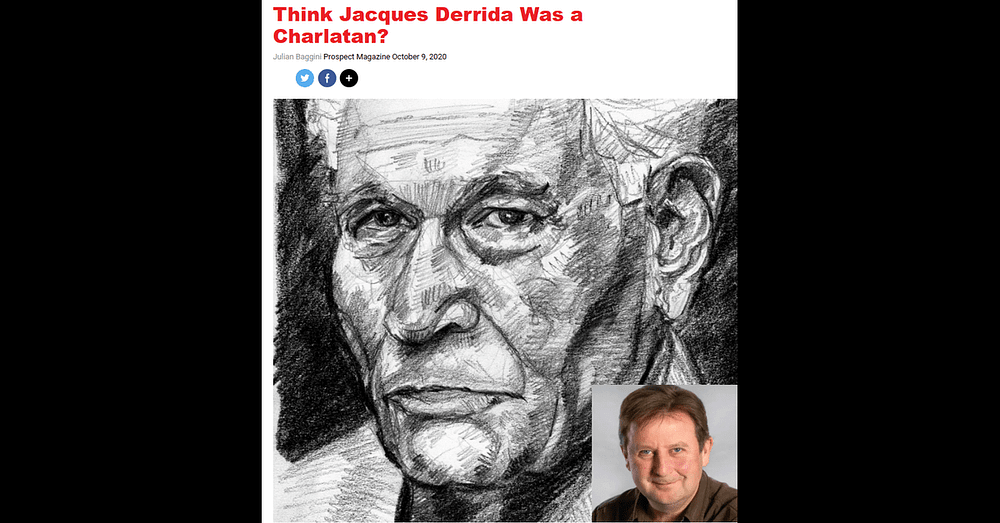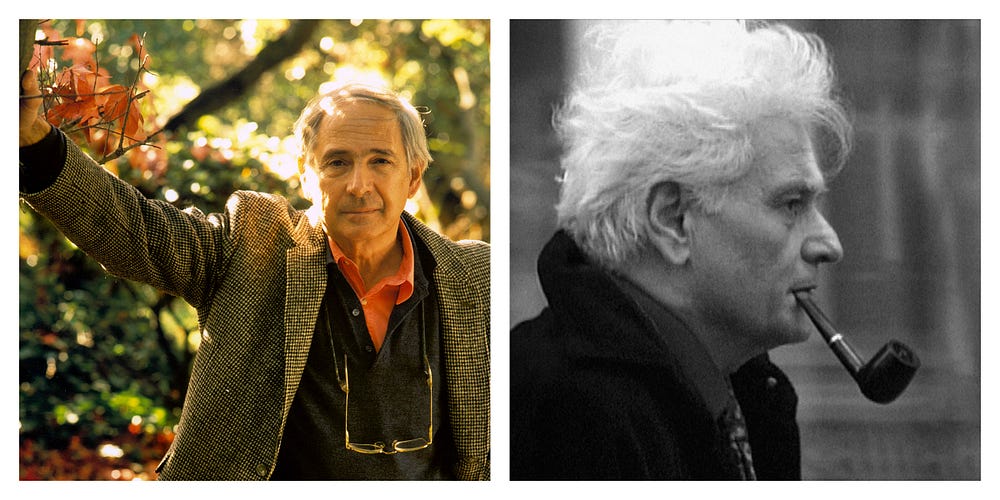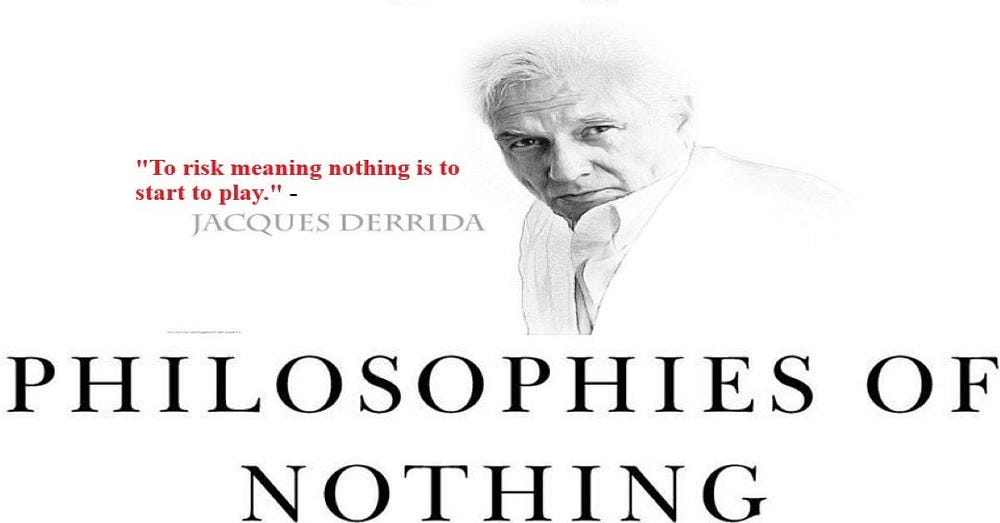This is my final essay on Julian Baggini’s Prospect article ‘Think Jacques Derrida was a charlatan? Look again’. (It’s a follow up to my ‘Julian Baggini on the Anti-Derrida ‘Cambridge Affair’ of 1992’ and ‘Philosopher Julian Baggini on Derrida and the Anglo-Saxon Academy’.) The following focuses on various banal, unoriginal and dogmatic claims by — and ideas from - Derrida, at least as they’re offered up by Julian Baggini.

“British-trained philosophers like myself don’t know much about Derrida, though that doesn’t stop some of them dismissing him. I don’t dismiss him, but nor do I know enough to be able to sum him up.”
— Julian Baggini. [The source of that passage can be found here. See note at the end of this essay.]
To offer up a forced binary opposition: Julian Baggini is on the side of those who believe that Jacques Derrida was a (to use his own words) “true philosopher”. The other side of that opposition believes that he was a “charlatan”. (See Baggini’s own forced binary opposition of Stalinism-vs-Catholicism later.)
The Derrida-was-a-true-philosopher position dates back to the late 1960s… and even before that.
Baggini writes:
“One of Derrida’s examiners at his prestigious high school, the Lycée Louis-le-Grand, wrote of his work: ‘The answers are brilliant in the very same way that they are obscure.’”
Perhaps this examiner was simply bowled over — or even hoodwinked — by Derrida’s writing style and its inherent (poetic or literary) obscurantism. Of course, that writing style is one of the (main) reasons why so many people still admire Derrida.
So how did this examiner know that Derrida’s answers were “brilliant” at the very same time as acknowledging that they were “obscure”? They were clearly not obscure enough for this examiner not to recognise that they were also brilliant.
Thus, perhaps Derrida’s answers either weren’t obscure at all, or they couldn’t actually have been known to be brilliant — precisely because they were obscure.
The same line argument can be aimed at Michel Foucault.
According to Baggini, Foucault said that Derrida’s work was “either an F or an A+”.
Nice line! But what does it mean?
Am I being a “pedant” here?
Am I merely “logic chopping”?
In other words, am I failing to simply immerse myself in the poetic and quasi-religious experience of reading Derrida?
On the other hand, if Derrida was truly a “joker” (as so many have claimed), then all this is made a little clearer.
Was Derrida a joker?
It’s hard to tell. Take the following words from Professor Eric Schliesser:
“Now one need not be friend of Žižek (who makes Derrida seem highminded), to recognize that one, thereby, is in no position to recognize that sometimes — maybe all the time in our fallen world in which our hands are sullied with innocent blood everywhere — the stance of the jokester is the only morally responsible stance.”
So was Derrida a joker, and that was a good thing?
Was he a joker, and that was bad thing?
Or was Derrida simply not a joker at all?
Julian Baggini’s Original Derrida

Some of the ideas which Julian Baggini claims (or sometimes merely hints) are original to Jacques Derrida… aren’t original to Derrida.
Indeed, the very opening subtext of Baggini’s article is a good example of this. It goes like this:
“A true philosopher: Derrida questioned his own peculiar methods as much as the things he was questioning.”
We also have this:
“Derrida’s project is diametrically opposed to that of most philosophers.”
Baggini adds that “Derrida’s whole project was one of radical doubt”.
Is Baggini (or Peter Salmon) really claiming that all this radical questioning wasn’t the case with many of the philosophers who came before Derrida?
Alternatively, is Baggini referring exclusively to those philosophers who belong to what he calls “the Anglo-Saxon academy”?
Now Baggini does seem to claim (or sometimes simply imply) that this radical questioning is peculiar to Derrida…
Actually, he seems to have it both ways.
Baggini emphasises Derrida’s profound originality (“Derrida’s project is diametrically opposed to that of most philosophers”), at the same time as stressing that he was part of a tradition:
“For all his 20th-century jargon, Derrida at heart belongs to a long line of sceptics that traces back to Pyrrho in Ancient Greece.”
Of course, it can be provisionally accepted that profound originality and being part of a tradition can exist together.
So perhaps it depends.
A tradition of “radical doubt” (even of one’s “own peculiar methods”) can most obviously be found in René Descartes’s work, and later in David Hume’s. It can also be found further back in history (as Baggini himself acknowledges) with various Greek philosophers.
Even Baggini’s stress on aporia isn’t original to Derrida.
Take this description:
“In philosophy, an aporia is a philosophical puzzle or a seemingly irresoluble impasse in an inquiry, often arising as a result of equally plausible yet inconsistent premises (i.e. a paradox).”
To take only a single example, that passage is an almost perfect account of Kant’s antinomies.
In addition, most general accounts of aporia mention its use in Greek philosophy. Worse for Baggini, it’s even called an “instrument of investigation in analytic philosophy”!
However, it’s the following additional definition of aporia that Baggini (as well as Salmon) link specifically to Derrida:
“It can also denote the state of being perplexed, or at a loss, at such a puzzle or impasse.”
Except that many of the critics of Derrida won’t see any states of being perplexed in his work. Quite the opposite in fact (as will be shown in a few moments).
What about Derrida’s position on truth — is that original?
Baggini writes the following:
“He was not a nihilist who denied truth, but a sceptic who thought ‘we cannot know whether there is truth or not.’”
Yet doesn’t that leave us in roughly — even exactly — the same position as a nihilist, or, indeed, a relativist? In other words, what practical or philosophical difference is there between denying truth outright and claiming that “we cannot know whether there is truth or not”?
More to the point, what do the words “we cannot know whether there is truth or not” mean?
Is it a poeticism?
Is Derrida’s non-nihilist position on truth something so deep and profound that it’s beyond explanation (or justification), and even without a (what Baggini calls) “fixed meaning”?
Derrida’s (or Baggini’s) Dogmatic Claims

Derrida (if only via Baggini) makes a lot of categorical — even dogmatic — claims.
For example, we have this categorical statement:
“Deconstruction is not destruction, as he was at pains to point out.”
Who says that deconstruction is not destruction?
Well, obviously, Baggini does, and Derrida did too.
Many others argue that deconstruction is (a mode of) destruction, and such people have done so in great detail.
What’s more, Martin Heidegger’s own term Destruktion was literally based on the word “destruction”. Take these words:
“Heidegger employs a number of words for ‘destruction’ — including Destruktion, Zerstörung, and ‘dismantling,’ ‘unbuilding,’ or ‘deconstruction’ (Abbau).”
More relevantly, Derrida borrowed this term from Heidegger himself.
Many sympathetic commentators on both Heidegger and Derrida see both Destruktion and deconstruction as being (philosophical) means of… destruction. (See the many links here.)
Now, of course, no one is claiming that (Derrida’s) deconstruction and (Heidegger’s) Destruktion are identical. Still, even if critical commentators are ignorant of Heidegger’s coinage, they still have a multitude of reasons for believing that deconstruction is a philosophical mode of destruction.
What’s more, even if Baggini provides arguments, then there’s still no reason why other people should accept his categorical (or dogmatic) claim that deconstruction is not destruction.
Another example of a dogmatic — or at least categorical — claim can be found when Baggini says (speaking of Derrida’s position) that
“[p]hilosophers’ attempts to pin down words are as futile as nailing jelly to a wall”.
Here’s another example:
“[W]hen talking of promising as a speech act, Searle wrote: ‘I am ignoring marginal, fringe, and partially defective promises.’ For Derrida this was inexcusable.”
Note the very-strong word “inexcusable”.
Here’s another categorical claim:
“By only focusing on abstracted, tidied-up, ideal forms of speech acts, Searle was ignoring how they actually work.”
Baggini is writing about the complexity of speech acts as they occur in the (as it were) real world. Thus, it’s a position against idealisation and rigidity. Yet Derrida was still telling us — in strong words — how speech acts “actually work”…
Yes, that’s right: Derrida told us how speech acts actually work.
So Derrida must have believed he knew how speech acts work. He must have also believed that he knew that John Searle didn’t know how they work. Yet Baggini also writes that
“Derrida thought it was another example of philosophy choosing a false precision over more truthful messiness”.
Is there false precision in Derrida’s statements about Searle’s (supposed) “false precision”? (Note that Baggini uses the term “truthful” about Derrida’s — as opposed to Searle’s — position.)
Baggini also writes:
“‘Crucial to [Derrida’s] thinking,’ says Salmon, was an opposition to the ‘violence of any gesture that pretends (assumes, supposes, presupposes) to know.’”
Did Derrida know that we can’t know any given x… or know anything at all?
Alternatively, did Derrida simply pretend, assume or suppose that he knew that we couldn’t know?
To move on. Some of Derrida’s ideas aren’t only unoriginal, they’re also banal.
Derrida’s (or Baggini’s) Banal Claims

The charge of banality raises the question (again) as to Baggini’s assumption (actually, he states it too) that most (many? all?) critics of Derrida haven’t actually read him. (This assumption was featured in my ‘Julian Baggini on the Anti-Derrida ‘Cambridge Affair’ of 1992’). Yet some critics have understood Derrida well enough to realise that it’s often the case that banality lurks underneath the arcane prose. Indeed, some of Derrida’s critics have cited many actual examples of this.
For a new example of banality, Baggini informs us that Derrida attempted
“to show that the way we think of things is not the only way they can be thought”.
We also have this:
“[A]s Derrida incessantly argued, all categorisations are to some degree arbitrary.”
The important and relevant word (from a philosophical point of view at least) is the last one — “arbitrary”.
The word “arbitrary” is strong.
Or at the least that word is often used rhetorically. Relevantly, it can be argued that it’s used rhetorically in the passage from Baggini above.
So here’s one definition of the word “arbitrariness”:
“Arbitrariness is the quality of being ‘determined by chance, whim, or impulse, and not by necessity, reason, or principle’. It is also used to refer to a choice made without any specific criterion or restraint.”
Derrida and postmodern philosophers have claimed (or often simply assumed) that something is arbitrary if it isn’t necessary. What’s more, poststructuralists and postmodern philosophers have really played on this assumption, and it’s even central to their various philosophies. (Think of the omnipresent phrase “the social construction of [x]” in this context.)
In detail. Because nature, culture, our mind/brain or whatever doesn’t force us to categorise x in the way (or ways) that we do actually categorise it, or “name” any given x with the name we do actually give it, then (the Derridean position is) it must be the case that any categorisation at all must be purely arbitrary.
Yet that’s not the case.
True, our choice of names or words are contingent, and, in a sense, of little importance to the philosopher. (Locke made this point way back in the 17th century. See here.) In other words, we needn’t have called trees “trees” or mountains “mountains”. So, sure, that’s just an English word, and the French word for a tree is just a French word too. However, this is to conflate not only linking the words we choose with contingency, and thus with arbitrariness, but literally all categorisations too.
Here’s another banality from Derrida (or from Baggini):
“For Derrida, it is not that nature has no joints, or that the world can simply be carved however we please. Rather, there is always more than one way to carve.”
Okay.
Asking questions about nature’s joints isn’t banal. However, Baggini must at least acknowledge that these types of question have been asked by numerous analytic philosophers in the 20th century — both before and after Derrida. Indeed, such philosophers have even used the phrase “carve nature at its joints”, and questioned the assumption — and even the possibility — that we can do so.
Baggini continued:
“[E]very slice divorces us from possible alternative ways of seeing and understanding. Naming is thus, says Salmon, a ‘founding act of violence [] before there is a road taken and a road not taken.’”
Now this ethical addition to a metaphysical thesis may well be original to Derrida. (The metaphysical thesis itself has been held by many analytic philosophers.) Or perhaps not. Derrida actually had very similar view to Emmanuel Levinas on this matter (see here).
Now take this banality:
“As a graduate student Derrida felt he faced a choice between just two available options: the ‘Catholics’ or the ‘Stalinists’. He rejected that dichotomy and this fed into his later attacks on binary oppositions as being philosophically fallacious.”
Sure, Baggini doesn’t actually quote Derrida here. Indeed, it may well be the case that Derrida himself didn’t actually use the term “binary opposition” in relation to this particular biographical choice of his.
In any case, having a problem with being forced to choose between only two options (or even seeing things in terms of only two options) is a commonplace situation noted by many adult human beings. What’s more, it’s commonplace to state that “there are more than two options” in many particular cases.
Sure, there may well be some genuine binary oppositions.
However, is Stalinism-or-Catholicism really such a thing?
Instead, was this just an option faced by a particular French philosopher (i.e., Derrida) at a particular time in history? In other words, why dignify this event in Derrida’s life with the pompous (technical) term “binary opposition”?
Conclusion

Julian Baggini finishes off his article on Derrida by saying that those with open minds
“will surely have their minds changed by Salmon’s scintillating account of his life and thought”.
That’s possible.
However, why on earth would (or could) a single book on Derrida make such a big difference? It may do so to those who’re new to Derrida. However, could it really be the case that those who previously believed that Derrida was a “charlatan” would suddenly stop believing that after reading Peter Salmon’s book?
Is that all it takes?
To put that another way.
Surely the understanding of Derrida isn’t dependent on a single biography written by Peter Salmon. Personally, I’ve never really understood Derrida. That’s the case even though I’ve been attempting to do so since the late 1990s.
So perhaps my true understanding was all dependent on reading Salmon’s biography of Derrida (published in 2020).
This single book may be my own — and many readers — gateway into Derrida.
Note
(*) To be fair to Julian Baggini, this passage was written in 2004. Perhaps things have changed since then. Indeed, perhaps Peter Salmon’s biography changes everything when it comes to “British-trained philosophers” — as well as others — getting Derrida.
My flickr account and Twitter account.









No comments:
Post a Comment